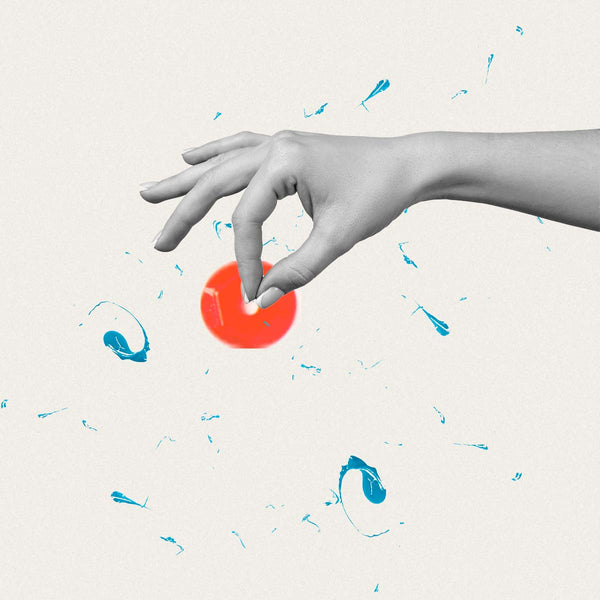Here’s the crazy thing about acne: It’s not just a teenager problem.
In fact, 42% of men between the ages of 20 and 29 report having acne, and 1 in 5 between 30 and 39 have acne too. Acne is a sneaky concern creeping its way into all age groups, even into the 50s. It just won’t say goodbye.
Don’t worry. We talked to our founding dermatologist, Dr. Steve, and got some insights about what causes acne and how to get rid of it.
If you’re curious about what type of acne you have, check out this informative blog post, Types of acne.
In this article you’ll learn
- What causes acne.
- The difference between acne and pimples.
- How to prevent acne.
- How to get rid of acne.
What causes acne?
So why does acne persist? It really comes down to several factors that conspire to block the pores -- the hair follicles -- of your skin.
- Bacteria called p.acnes -- acne’s namesake -- lives on everyone’s skin surface. That’s where it starts.
- The bacteria thrives on natural skin oil (sebum), and our glands produce lots of oil. (Our skin is thicker and more dense than women’s skin, which is why acne is more common in men).
- When dead skin cells aren’t swept away by washing, they combine with the bacteria and oil to clog the follicles (called follicular hyper-keratinization).
- These clogs create an immune response that gives rise to inflammation in the form of blackheads (which open at the skin’s surface where they interact with oxygen, imparting a black appearance) and whiteheads (just under the skin’s surface, rendering them white).
Acne vs pimples: what’s the difference?
Acne is a broad term that can describe several conditions. “You can have acne and no pimples,” said Dr. Steve: The following can describe the conditions of acne:
- Inflammatory papules, which is essentially a pimple.
- Sebum production.
- A microbiome with p acnes.
- Hyperkeratinization of the follicle (abnormally rapid shedding of skin cells).
- Inflammation.
- Increased transepidermal water loss (water loss through the skin barrier).
Pimples are the most obvious and annoying sign of acne. “You could have acne and only those deeper cystic lesions,” said Dr. Steve. “Sometimes pimples are hair follicle infections, folliculitis, it's not acne. Sometimes you get a pimple randomly on your buttocks or your leg — that doesn't mean you have acne, it just means you got a pimple and the right medical term is furuncle, which is basically a hair follicle infection.”
How to prevent acne
- Keep dirt, oil and bacteria away — i.e., wash your face. Simple. Do it every day when you wake up and before you go to bed. Avoid bar soap if you can — most of them will strip away beneficial oils. Go with a liquid exfoliant with salicylic acid, like our Everyday Face Wash, and here’s why: Acne forms when excess oil, dead skin cells, and bacteria become trapped inside the pore, causing inflammation and pus-filled pimples. Salicylic acid breaks down the bonds between dead skin cells, so they can be released and unclog blocked pores
- Keep your pillow clean and don’t touch your face. For the same reasons as #1. Accumulating dirt, oil, and bacteria can lead to clogged pores and breakouts.
- Eat right. There’s not a lot of science to support the idea that certain ingredients, like excess sugar, can lead to breakouts, but the anecdotal evidence is tough to dispute. There are studies that point to how a diet rich in antioxidants can stabilize skin molecules that can leave skin clearer, calmer, brighter and more even-toned. So it’s never a bad idea to stock up on vitamins A and C (in fruits and vegetables), lycopene (in tomatoes), astaxanthin (salmon) and polyphenols (green tea, dark chocolate).
- Exercise: Regular workouts boost hormones and neurotransmitters like serotonin, dopamine, and endorphins, which makes you happy and energized, It also levels out blood sugar levels, which can lead to oily skin and acne production. Exercising also boosts your circulation, meaning that every tissue in your body receives more oxygen.
- Use a moisturizer: A moisturizer will protect your skin barrier from toxins and pollutants, which will reduce the amount of gunk that can potentially clog up your pores and cause acne. The hyaluronic acid moisturizer in our morning cream protects the skin barrier.
- Relax. Stress can produce cortisol, which can prompt the body to produce internal free radicals, unstable molecules that act like little missiles that target cells for destruction. When free radicals target DNA, the result can be skin cancer. When they target collagen, you get fine lines and wrinkles. When they target lipids (the skin’s natural fats), it can lead to dehydration, skin barrier damage, and acne.
- Retinol: If acne is a problem and you want to prevent its recurrence, retinol will be your best friend. It’s the ace ingredient in our night cream with a one-two punch — it mitigates oil production and helps replenish healthy skin cell production.
How to get rid of acne
The battle against acne isn’t won overnight, it’s not even won over a few weeks. Be aware that it takes an acne pimple about four weeks to form on your skin. “I tell my patients over and over again: you must commit to fighting acne for a minimum of 90 days to see results,” said Dr. Steve. “Most of the battles against acne are not lost because of the treatment, but by the inconsistency of use.”
Not that you won’t see results before 90 days. If you start treating acne right now, and you haven't been treating it at all, in a two to four week timeframe, you’ll begin to see the following happen:
- Create a better skin surface to calm your skin’s immune response.
- Decolonize your face of bacteria.
- Modulate the oil your skin is producing.
- Normalize the keratinization of the skin.
Since oil, bacteria, and excess skin cell buildup in the hair follicle are all individual drivers of acne, we need ingredients to target each of these things. Here’s how we do it at Geologie:
Step One: Wash
Sayonara bar soap! You need real exfoliating face wash to win the battle against acne. Most of our face washes (and all of those for acne prone guys) feature salicylic acid, which is a liquid exfoliator that loosens and breaks apart attachments between cells in the outer layers of the skin. “Salicylic acid is anti-bacterial, so it attacks the p acnes bacteria that lives on all of our skin,” said Dr. Steve. “It’s a cornerstone of the multi pronged approach to fighting acne.”
Step two: Moisturize
Seems counterintuitive to be moisturizing an oily face, but a moisturizer will protect your skin barrier from toxins and pollutants, which will reduce the amount of gunk that can potentially clog up your pores and cause acne. The hyaluronic acid moisturizer in our morning cream does this in spades.
Step Three: A Retinol-Based Night Cream
And then there’s the real anti-acne workhorse ingredient, retinol, which accelerates cell turnover and saps oil. Over the long term this healthy cell regeneration process reduces scars, fine lines and wrinkles. It’s the key ingredient found in all of Geologie’s Repairing Night Creams -- making the night regimen by far the most important aspect of any battle against acne.
“Retinol is helping with a few things: it's getting rid of the sebum, the oil that feeds the inflammation, and it's also helping reduce the dead skin from plugging up in the follicles, the process when an open comedone becomes a closed comedone, so you’re less likely to get a pustule, or papule for acne,” said Dr. Steve.
We’ve helped thousands of guys tame their acne and get clear skin. We can help you too. Take our diagnostic and let’s get started.
My acne won’t go away and I've tried everything
Dr. Steve: Nodular and cystic acne are the most difficult to treat with online or over-the-counter products. But as for the other acne types — whiteheads, blackheads, papules, and pustules — I tell guys all the time, avoid these three fails and you’re on your way to clear skin:
- Lack of consistency. Acne is a chronic condition we need to continuously address. Some guys just apply a cream a few times and wonder why it doesn’t clear their acne immediately. You need to stick to it for 90 days for results to kick in.
- Too much product. Guys put a glob of product on their face hoping to knock out their acne aggressively. This usually causes more irritation than is normal and is another reason why guys abandon the program.
- Too complicated. Many guys who come to me are carrying a bag with four different products they’re using. This mixing and matching causes more irritation than you really want or need. Plus, guys are spending a lot of money on these products and are disappointed when they don’t see results immediately. Get simple.
You don’t beat acne with a magical pill, drug, or cream. It’s done with a commitment to simplicity, consistency, and applying it correctly. That’s it.
How Geologie can help fight acne
Go personalized! Take our skincare quiz for an anti aging skincare routine personalized just for you.
Want something quick and easy? Try our Acne Duo, Sensitive Acne Duo or Extra Strength Acne Duo. This is our simple 2-step skincare solution made up of our salicylic acid face wash and retinol night cream - perfect for fighting breakouts.
Not ready for a routine? A good place to start is with our best selling Salicylic Acid Exfoliating Cleanser 2-Pack. The primary active ingredient is 2% salicylic acid – is an ace exfoliator that combats acne and oil, reduces inflammation, and promotes healing.
Still not sure? Browse our entire catalog of acne skincare products.




























